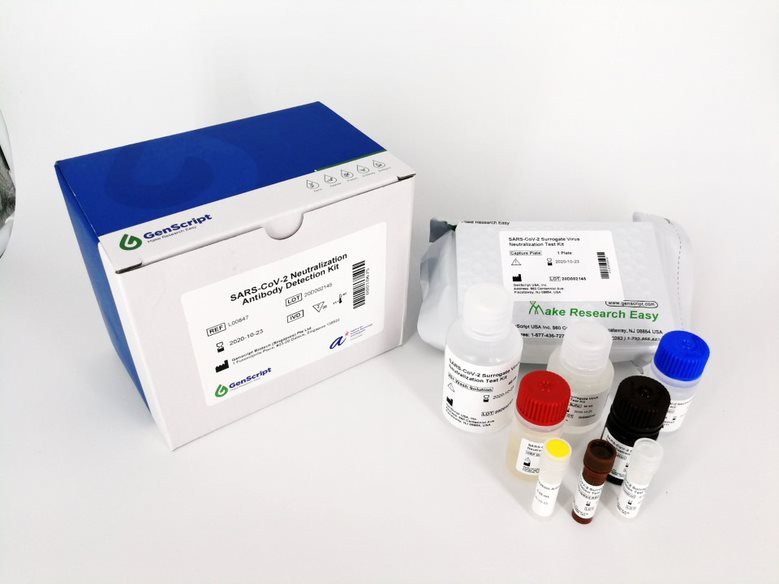
Photo credit: GeneScript
Duke-NUS Medical School (Duke-NUS), a research-intensive graduate-entry medical school, GenScript Biotech Corporation, a leading global biotechnology company, and the Diagnostics Development Hub (DxD) at Singapore’s Agency for Science, Technology and Research (A*STAR), announced an exclusive agreement to co-develop and manufacture a unique serological coronavirus (COVID-19) detection system known as the surrogate virus neutralisation test (sVNT) or cPass™. This test is the first in the world that allows rapid detection of neutralising antibodies (NAbs) – the specific antibodies present in the serum of COVID-19 patients that are responsible for clearing the viral infection, without the need of live biological materials and biocontainment facility.
While there are many COVID-19 lab-based antibody test kits commercially available, this is the first that is capable of measuring functional NAbs. Without a simple test kit, measuring NAbs requires the use of live virus, cells, highly skilled operators, and complex laboratory procedures that are generally less sensitive and require several days to obtain results. By contrast, the cPass™ can be rapidly conducted within an hour in most research or clinical labs, and is also amenable to high throughput and fully automated testing after minimal adaptation. This test will also help in current COVID-19 investigations, from contact tracing to determining infection rates, herd immunity and predicted humoral protection.
Professor Wang Linfa, Director of the Duke-NUS’ Emerging Infectious Diseases programme, and team conceived this research and invented the cPass ™ diagnostic test. The team also did the assay development and testing in Singapore.
GenScript went through the steps of proof concept research, product design, development and optimisation, and now plays a central role in the commercialisation process, using its global network and manufacturing capacity to launch cPass™ in Singapore and other regions around the world.
DxD Hub is a national initiative led by A*STAR’s commercialisation arm, A*ccelerate. To take this sVNT to market, DxD Hub validated the kit with clinical samples, and developed the manufacturing protocol and quality controls to secure its provisional authorisation by the Health Sciences Authority. DxD Hub will also be producing the pilot batch for use in Singapore hospitals. There are plans for this know-how to be transferred to local biotech companies for scaled-up production.
“The cPass™ developed by our team can be used for contact tracing, reservoir or intermediate animal tracking, assessment of herd immunity, longevity of protective immunity and efficacy of different vaccine candidates. It does not require a biosafety containment facility, which makes it immediately accessible to the global community, including many developing nations,” said Professor Wang Linfa, the principal investigator of this collaboration. One of the most internationally recognised experts on emerging zoonotic viruses, he currently serves on multiple World Health Organisation committees focusing on COVID-19.
“Duke-NUS is excited to partner with GenScript as well as DxD Hub to address the challenge of COVID-19 serology with this novel detection system. This could be a game changer in the field of COVID-19 investigation,” said Professor Patrick Casey, Senior Vice Dean of Research at Duke-NUS.
“This innovative platform developed by our researchers will be extremely useful for quick and reliable surveillance to determine how widely a population has gained immunity to SARS-CoV-2 virus. The partnership with GenScript and DxD Hub combines complementary strengths as we work together to fight this global outbreak,” said Professor Thomas M. Coffman, Dean of Duke-NUS.
Dr Zhu Li, Chief Strategy Officer of GenScript added, “The serological detection system developed by Prof Wang is unique, innovative, and has many advantages, such as high sensitivity and specificity, and applicability to all antibody isotypes. The test results will be of great help to governments in guiding the resumption of work since it is extremely useful for quick and reliable surveillance to determine how widely a population has gained immunity to SARS-CoV-2 virus. Detection of neutralising antibodies determines who can more safely go back to work or to more social life. Our partnership with Duke-NUS and DxD Hub is one of several proactive steps we are taking to strengthen our R&D and manufacturing capacity to meet this urgent global need.”
“Recently, GenScript has started to serve Singapore market by utilising our internal sales organisation along with other commercial functions for market access, marketing and distribution. We are excited to be part of the thriving culture of innovation across laboratories in the Asia Pacific Region. Our partnership aims to make the best use of our mutual capabilities, expertise, and resources, which helps us to serve our community better,” said Johnson Wang, President in Asia Pacific Region at GenScript.
Sherry Shao, President of Life Science Group at GenScript echoed, “The collaboration with Duke-NUS is a key example of how global industry and academia work together to make things happen. Leveraging the leading technologies in molecular biology, protein science and immunology, we help our partners in virus mapping, detection, treatment and vaccine development. GenScript is committed to fighting the pandemic with the world.”
Dr Sidney Yee, CEO of DxD Hub said: “As Singapore’s national platform that provides end-to-end expertise in bringing diagnostic kits from bench to bedside, DxD Hub is proud to be part of this collaboration with Duke-NUS and GenScript. This innovative cPass™ diagnostic kit will be instrumental in supporting the fight against the global pandemic.”
The cPass™ assay was validated with samples of patients from PROTECT- A Multi-centred Prospective Study to Detect Novel Pathogens and Characterise Emerging Infections, coordinated by Singapore’s National Centre for Infectious Diseases.




